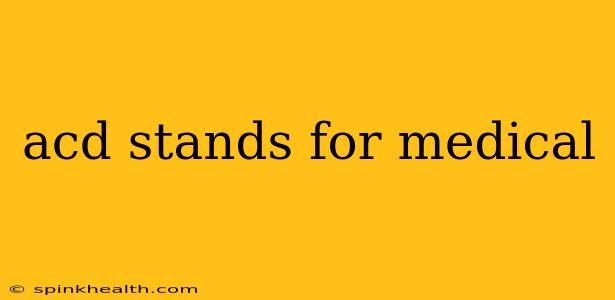Decoding the Mystery: What Does ACD Stand For in Medical Terms?
The abbreviation "ACD" in the medical field isn't as straightforward as one might hope. Unlike some acronyms, ACD doesn't have a single, universally accepted meaning. Its meaning depends heavily on the context. Let's unravel the possibilities and explore some common interpretations. My journey into this medical acronym started with a simple Google search, and I discovered that the ambiguity makes it a fascinating puzzle.
One of the most frequent meanings I encountered was Acid Citrate Dextrose. This is a crucial element in the world of blood collection and preservation. But let's delve deeper.
What is Acid Citrate Dextrose (ACD)?
Acid Citrate Dextrose (ACD) is an anticoagulant solution used in blood collection. It prevents blood from clotting by binding to calcium ions, a vital component in the coagulation cascade. Imagine it as a carefully balanced chemical cocktail that keeps the blood flowing smoothly, preventing it from forming clots, even after it's been drawn from the body. This is extremely important for various medical procedures that require the use of whole blood, or its components. The specific formula of ACD can vary slightly, leading to different formulations like ACD-A, ACD-B, and so on. Each variation is tailored for specific purposes and blood component preservation times.
The story behind ACD is quite interesting, reflecting the evolution of blood transfusion techniques. Early blood collection methods were often less effective, leading to clotting and reduced usability. The development of ACD represented a significant advancement, allowing for safer and more effective storage and use of blood products.
What are the different types of ACD solutions?
This is where things get even more specific. Understanding the nuances of ACD formulations requires going beyond the basic definition. Let's examine the common variations:
- ACD-A: This formulation is commonly used for whole blood storage, particularly for applications like HLA typing (identifying human leukocyte antigens).
- ACD-B: This variant has a different formulation that affects how the blood components are preserved, often used for DNA extractions or other specific laboratory applications.
The precise composition of each ACD formulation ensures optimal preservation of blood components, maintaining their viability and integrity. It's a precise science, a testament to advancements in blood banking and transfusion medicine.
Other Possible Meanings of ACD (Less Common)
While Acid Citrate Dextrose is the most prevalent medical interpretation, it's important to note that ACD might represent other terms in specialized contexts. Without further information from the original source where you encountered the acronym, it's impossible to be entirely certain. This highlights the importance of considering the broader context whenever deciphering medical abbreviations.
How can I be sure of the meaning of ACD in a specific context?
Always check the surrounding text or the accompanying documentation. If you encounter ACD in a medical report, journal article, or other professional setting, look for clues that help to pinpoint the exact meaning within that specific usage. If you are still unsure, always consult with a healthcare professional or someone with relevant medical expertise. This careful approach will prevent any ambiguity and ensure a precise understanding.
In conclusion, while ACD most commonly refers to Acid Citrate Dextrose, a vital anticoagulant used in blood collection and preservation, it's crucial to remember the context-dependent nature of medical abbreviations. Understanding the specific variations within ACD formulations further underscores the importance of precision in medical science.

